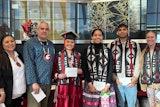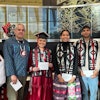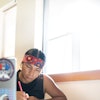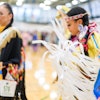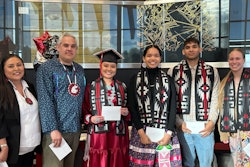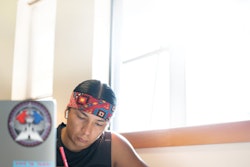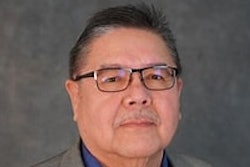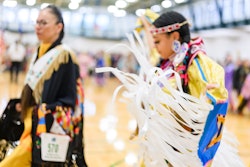More than 70 Navajo teachers, administrators and counselors from four states convened at the Navajo Nation Museum in Window Rock, Arizona, on June 20 and 21 to explore challenges and strategies for promoting educational sovereignty for the Navajo Nation.
Assistant Superintendent Dr. Timothy Benally set the tone for the conference by challenging the participants to examine the structure and politics, and also the curriculum necessary to move toward true educational sovereignty for the Navajo Nation.
Dr. Manley Begay, Jr., from Northern Arizona University and a member of the board of trustees at Fielding Graduate University, delivered the keynote address on “Navajo Nation Building: Challenges and Hopes for the Future.”
Navajo graduates from the doctoral program of the Fielding Graduate University presented their research related to infusing Navajo values, culture, language and history into the curriculum and advancing education opportunities in the Nation. Major sections for discussion at the conference included Navajo goals for Navajo education; Navajo culture and principles; effective classroom instruction; and higher education and professional development.
A consistent theme explored by both the speakers and the audience of Navajo educators was how education can be better aligned with the Mission of the Department of Diné Education which is “to provide lifelong learning for the Navajo People and to ensure the cultural integrity and sovereignty of the Navajo Nation.” Specific research was presented on how to integrate weaving, Navajo creation stories, drumming and singing into the curriculum.
Dr. Tommy Lewis, Superintendent of Schools for the Department of Diné Education, spoke about teacher education and what is being done to improve teaching, learning, and student academic achievement.
“Attaining the highest level of education including certification and licensures are critical for our teachers, principals, administrators, and superintendents,” said Dr. Lewis. “Producing scholarly material on best practices, leadership, ethics, teaching and learning is very important so others can learn from those who know best on what matters and what is important”.
 Dr. Barbara Mink
Dr. Barbara MinkAlso discussed were ideas presented by Ceceilia Tso on redesigning the Navajo Nation Teacher Education Consortium (NNTEC) to serve more as a catalyst for educational reform and to create a Resource Center/Clearing House for Navajo educators. Dr. Henry Fowler pointed out, “Education is one of the main components for the Navajo Nation to be successful in building a brighter future for the Navajo children.
Tso, Program Manager of NNTEC, noted that “NNTEC has been doing this work for more than 25 years; today’s research and data will impact the next 100 years towards our goal of educational sovereignty. Therefore, it is critical for Navajo language and culture to be embedded into our systems across our Nation. Navajo teacher/educators are the turn key for our future generations to continue to be a sovereign Nation.”
Tso added that the Navajo Nation Teacher Education Consortium addresses the issue of improving education for the Navajo Nation by producing great teachers for Navajo Nation schools. To broaden its impact NNTEC will be opening up its membership to other academic institutions and to school systems that impact Navajo education to create more programs for Navajo teachers.
The closing session explored the types of research that future Navajo doctoral students could undertake to strengthen the Navajo educational system. Ms. Rose Graham, Program Director of the Office of Navajo Nation Scholarship and Financial Assistance (ONNSFA) and Dr. Barbara Mink, Program Director in the School of Leadership Studies of the Fielding Graduate University indicated that they are committed to working with, and supporting, Navajo educators who are interested in pursuing advanced degrees.
The educational conference was jointly organized and sponsored by the Navajo Nation, the Office of Navajo Nation Scholarship and Financial Assistance, Navajo Nation Teacher Education Consortium, Department of Diné Education, and the Fielding Graduate University (Santa Barbara, CA).
Plans are underway to develop a graduate education cohort of Navajo peers who would work together on educational challenges in the Nation. Ms. Tso encouraged past graduates to continue networking with government departments to share their research and to assist with issues such as economic development and educational sovereignty.
Dr. Barbara P. Mink is the program director and professor in the School of Leadership Studies at Fielding Graduate University.
